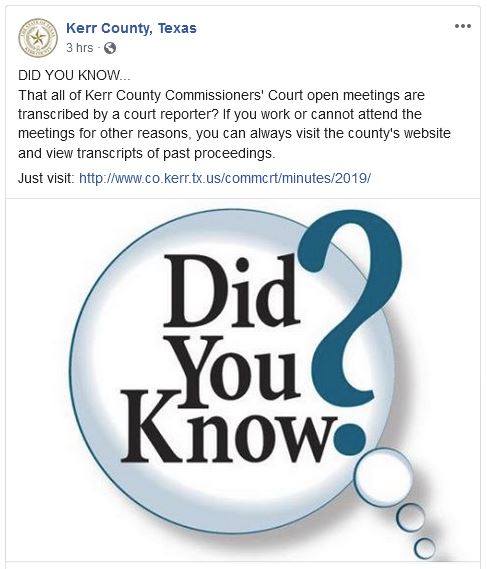Part of the controversy surrounding the recent Animal Services policy change has to do with whether or not the Kerr County Commissioners made decisions behind closed doors in executive session, and whether or not it was appropriate to discuss those types of policy changes in secret. Commissioners have repeatedly denied that any action was taken behind closed doors, and they insist that no decisions were made about the policies in executive session.
Here’s the problem we face at the moment… There is no way to verify what is and isn’t true regarding their insistence that everything was done properly. Since the county does not record their meetings in audio or video format, only those that were present can currently say what happened, what didn’t happen, what was in executive session, and what was in open session. The court’s minutes are generally only released several weeks or more after the meetings take place, giving the citizens no way to know exactly what transpired. This is a major problem when we all try to react to, and follow, current issues and events.
For instance, right now, the commissioners are defending their actions taken during the October 15 meeting, but we have no minutes to refer to when fact-checking their claims. The most recent minutes that have been posted are from September 16, although several meetings have occurred since then.
And since Commissioners Court meetings usually take place early on Monday mornings, the average citizen cannot attend the meetings or follow the county’s work, since the vast majority of voters work on Monday mornings.
Recently, the Kerr County, Texas Facebook page posted the following, urging citizens to engage with the court and follow its work by reading the minutes of the meetings.

There are some major problems with this approach…
- Timeliness — Since the minutes are only posted weeks or a month after the meeting, the voters cannot follow the court’s progress in a timely manner.
- Accessibility — The most recent set of minutes from a regular court meeting come in at 86 pages in length and approximately 18,000 words. Given that the average reader can consume approximately 200-250 words per minute, that’s 72-90 minutes of reading for the average voter — at least once per month — just to keep up with the activities of the regular meetings.
- Tone & Inflection — Verbatim transcripts do not convey the feelings, tones, inflections, and other context clues that can be used to discern the meaning of a statement. Sarcasm or condescension is not easily conveyed in the written format that we have now.
- Expense — The court reporter for the commissioners court receives a salary of $78,141 per year. Court reporters are expensive and are not required if a county chooses to film or broadcast their meetings to the public.
Video Broadcasts In Lieu of Minutes
According to the Texas Association of Counties 2019 Open Meetings Act Handbook, counties are required to either keep minutes or make a recording of each open meeting. “Recording” is defined to mean a tangible medium on which audio or a combination of audio and video is recorded, including a disc, tape, wire, film, electronic storage device or other medium.
Texas Government Code Section 551.021 sets forth the requirement for minutes OR recordings of each meeting. And Texas Attorney General’s Opinion No. GA-0727 clarifies that making a recording is a valid method of satisfying the requirements set forth in that section of the law. Either written minutes or audio/video recordings are acceptable under the law.
When a county reaches a population of 125,000 or more, the court is REQUIRED to film and broadcast meetings on the internet (Tex. Gov’t Code §551.128. Thirty-one counties meet this population bracket according to the 2010 census). Kerr County will not meet that population milestone any time in the near future, but it does NOT preclude or prevent the county from filming and broadcasting their meetings right now (Tex. Gov’t Code §551.128[b]).
Therefore Kerr County could choose to record audio and video of their public meetings, make those available online, and potentially reduce the cost to the taxpayer by negating the need for a court reporter to take the verbatim minutes.
Speed and Transparency
In addition to the potential cost savings, recording the meetings in audio/video format is the right thing to do because it increases public access to meetings that are difficult, if not impossible, to attend because of their timing. Citizens that work should not have to make a choice between following the work of their elected officials or going to work each Monday morning.
By filming the meetings, Commissioners could make the meetings more accessible and transparent, and could increase the speed at which citizens can follow relevant events and issues that arise at the court meetings. Because video recordings are quick and easy to distribute via free platforms such as Facebook, YouTube, etc., the meetings could be online and accessible within 24 hours (which is the standard practice at the City of Kerrville).
By quickly releasing a video recording of the meeting, commissioners would be better served, because citizens could get information first-hand from the mouths of the commissioners rather than filtered through the writings in the newspapers. Citizens also wouldn’t have to wait a month to read the incredibly lengthy minutes of each meeting.
Local Precedent
The City of Kerrville began recording and disseminating the videos of their City Council meetings and workshops several years ago. The City installed several video cameras and microphones in the council chambers, and each meeting is broadcast live, and subsequently uploaded to YouTube for the general public to access. Members of the public, council members, and staff rely on these video recordings to review the happenings of each meeting.
City Council recently voted to add even more functionality and accessibility to their recordings by including closed captioning services, which will allow the hearing-impaired to access the meetings, as well as providing a searchable index of the text of the meetings.
But this level of implementation is not required. A recording system could be as simple as a few microphones and a single video camera installed inconspicuously at the rear of the courtroom. A single operator can monitor the recordings, upload them, and maintain the archive. This wouldn’t even require a new person on the payroll — we would be happy to help train staff to start doing this immediately.
Cost and Implementation
The initial cost of installing and operating video and audio recordings does not have to be insurmountable for the county. Kerrville United has a standing offer to assist the county either by way of free consultations, or by providing free equipment to the county to implement a recording process. This offer still stands, and we’d be happy to speak with county officials about putting this in place.
What’s Next?
We invite the public and the county officials to review the links in this document and to post an agenda item to discuss and take action on the implementation of a recording system. When you speak with county officials, please encourage them to take this step towards increased transparency and accessibility for the benefit of all voters and residents of Kerr County.
Please consider signing our petition to encourage County Commissioners to implement a video recording policy for all public meetings.





